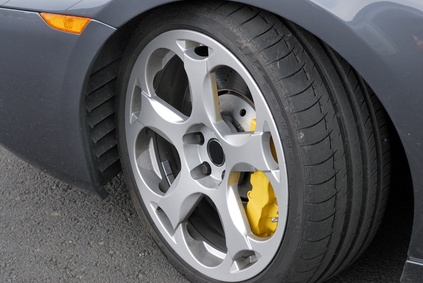
"Squishy," "soggy" or "spongy" are words often used by drivers when they describe a brake problem. The pedal should always feel firm, with a positive hold on the brakes when applied. If the pedal feels "spongy," the brakes are not functioning properly. This must be corrected immediately, since stopping power is critical to a motorist's safety.
Air in hydraulic brake lines is a common cause of spongy brakes, according to technicians at Randal Racing. A brake system relies on hydraulic fluid and no air should be in the system. To eliminate the air, a procedure called bleeding the brake lines must be performed.
The brake lines are steel tubing. Over time, rust can develop on the lines. This is particularly true for cars that are driven in coastal areas or in northern climates, where salt is spread on the roads. The rust "eats away" at the tubing and the walls of the tubes can become paper thin. Eventually, pinhole leaks develop, reducing the hydraulic pressure in the brake lines. Inspect your brake lines and look for areas of heavy rust. Inspect the areas around the lines and look for wet spots. If leaks are found, the brake lines will have to be replaced.
Bad disc-brake calipers can make a brake pedal feel spongy. Corrosion can build up inside the caliper, causing the internal piston to leak brake fluid. If a caliper is suspected, it should be tested by a qualified mechanic.
Many cars have disc brakes on the front wheels and drum brakes on the rear wheels. Bad wheel cylinders in a drum-brake system can also make the pedal feel spongy. Internal corrosion can cause the pistons to leak brake fluid, reducing the hydraulic pressure. The drum-brake cylinders also should be tested by a mechanic.
The master cylinder also could be the cause of spongy brakes. It is the heart of the brake system, and because of wear or age, it may be giving out. Fluid could be leaking around the pistons, instead of providing pressure to the wheel cylinders and calipers. It is vital to have the system checked out by a qualified technician because a malfunctioning master cylinder could cause the brakes to fail.